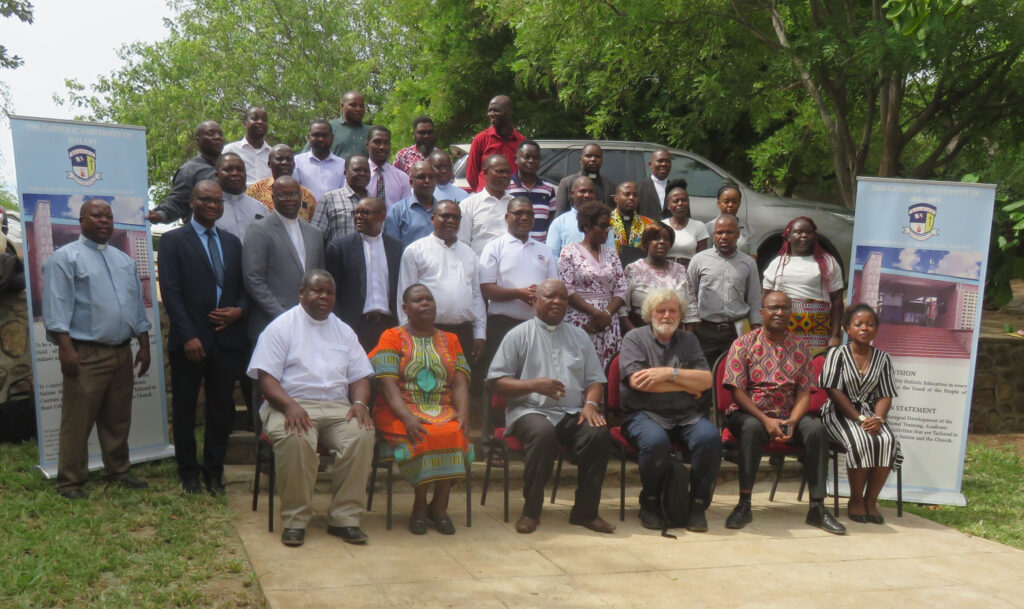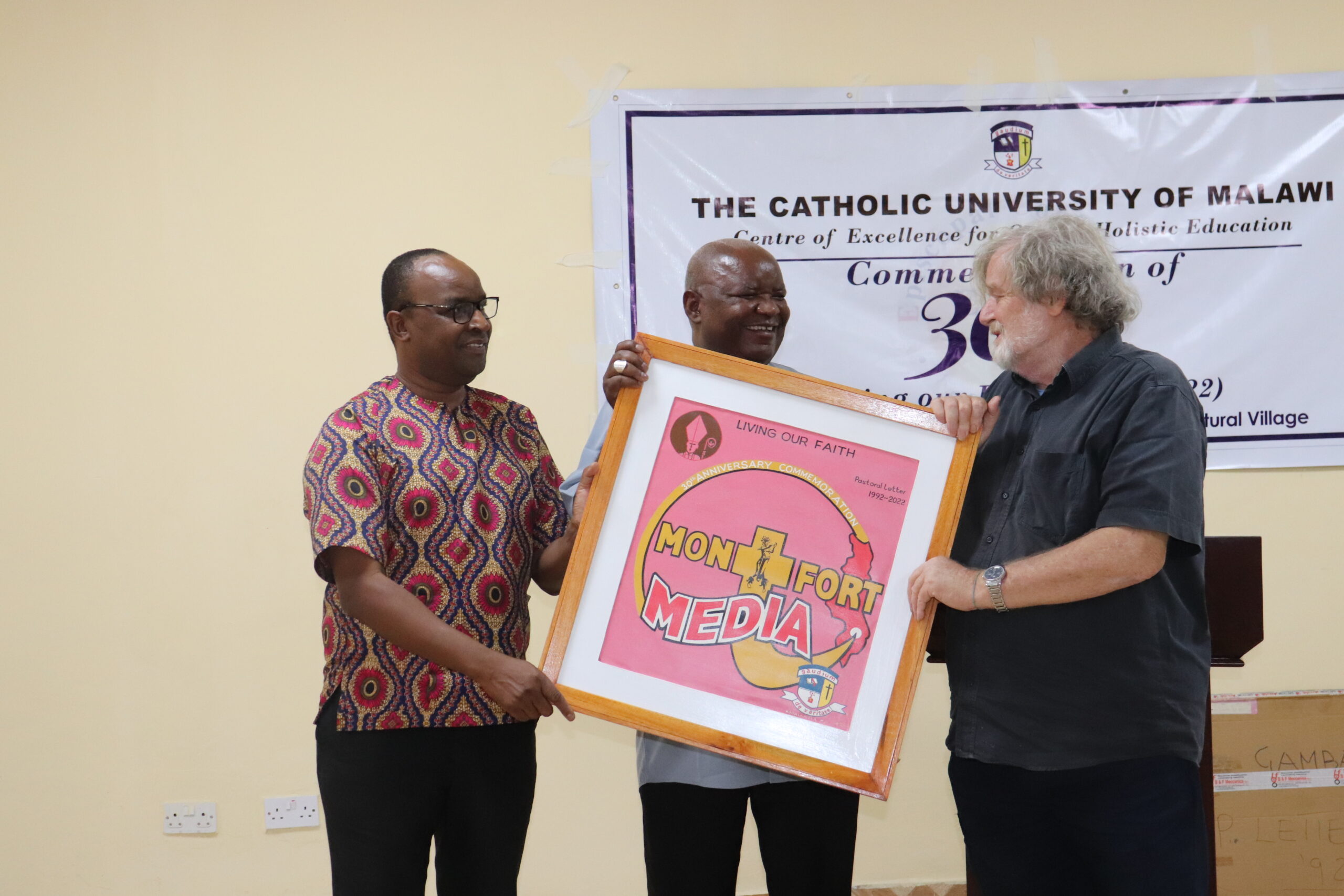MALAWI: Celebrating 30 Years of Pastoral Letter ‘Living Our Faith’

Group photo during celebration of 30 years of living Our Faith, Malawi
Joseph Kayira and Luke Bisani
Some 30 years ago, a small printing house in southern Malawi, Montfort Print, took a bold step to print the Bishops’ pastoral letter that became a political ‘bombshell in the history of Malawi. This pastoral letter authored by the Episcopal Conference of Malawi (ECM), entitled ‘Living Our Faith’ would forever change the political terrain in a country where its leader President Dr Hastings Kamuzu Banda ruled with an iron fist.
His Malawi Congress Party (MCP) with its paramilitary wing – the Malawi Young Pioneers and its Youth League – terrorized everyone seen to be opposing Dr Banda. When Montfort Print made a decision to print the pastoral letter of the Catholic Bishops at the height of Dr Banda’s autocratic rule, it meant taking a bold step against a system that was so entrenched in violence and the disappearances of those who did not agree with it.
When Father Piergiorgio Gamba, a member of the Montfort Missionaries and director of this small print accepted to print the pastoral letter, he was aware that he was simply walking into a den of lions. He was ready to face the challenge that even his colleagues wondered whether or not such an undertaking was worth dying for. But he was ready to face even death. It is unbelievable that he took that path to challenge what Chakufwa Chihana described as a party of death and darkness.
But this letter changed everything. It was a watershed. It led to many things, including the arrest and release of the Catholic Bishops; the extraordinary MCP Convention; the burning down of Montfort Print in Balaka; the birth of the underground press of midnight leaf lets; the arrest, trial and imprisonment of Chihana in Blantyre; the violent labour strike which had over 60 people shot dead in Blantyre and Lilongwe; the imposition of donor sanctions on the government; the formation of Public Affairs Committee (PAC); the establishment of AFORD as a pressure group in August; the establishment of the UDF as a pressure group in October and the calling of a National Referendum by Dr Banda also in October. After 30 years of ‘Living Our Faith’ the question remains, ‘Is this the change that they wanted?
The Catholic University of Malawi (CUNIMA) brought together experts in different fields to commemorate 30th anniversary of the letter in the lake district of Mangochi on the southern tip of Lake Malawi. Another key area was where the university presented awards to Father Gamba and Bishop Allan Changwera, the only remaining bishop among those who authored the letter. The others were Archbishop James Chiona, Bishop Felix Mkhori, Bishop Alessandro Assolari and Bishop Gervasio Chisendera. Monsignor John Roche was also part of the team that authored ‘Living Our Faith’.
At the two-conference commemorating the 30th Anniversary of the Pastoral in Mangochi at Mpale Cultural Village from 15th to 16th December 2022, CUNIMA University Council Chairman Most Rev. Thomas Luke Msusa said the Catholic Bishops were brave to challenge the party rule led by Malawi Congress Party (MCP) through the letter.
The need for a reflection
Fr Gamba says “we were born the day we printed this letter.” He recalls how MCP hoodlums petrol-bombed the print in Balaka in reaction to the contents of the pastoral letter. He emphasizes the need for courage at times like these.
“We had to do it. We printed the pastoral letter knowing too what it would trigger. But we need to be courageous when dealing with regimes that instill fear in their people. That pastoral letter helped us to gain freedom; it helped us to have a referendum in 1993 and later the general elections in 1994.
“I recall the words of former president Bakili Muluzi who when he visited us in Balaka said ‘This is actually where democracy was born. The reflection of the 30 years of this pastoral letter is very necessary. Do we have to restart all over again? What should be the way forward for our democracy?” Father Gamba says.
He applauds CUNIMA for the initiative to commemorate the 30 years of Living Our Faith and suggests that it would also be in order not to forget celebrating 30 years of the referendum next year.
He says: “June 14 is a very important day but was removed as a holiday. This is the day people voted that they wanted multiparty politics; that they wanted democracy to return to Malawi. Such a day cannot be removed as a holiday. It is quite a unique day to the history of Malawi.”
Bishop Martin Mtumbuka says pastoral letters are like homilies. “They are not there to excite the listener but to convert them.” He adds that the letters cannot be compared to novels as they are there to continue teaching and reminding us on issues bordering on governance and other key areas of the economy.
“The uniqueness of the pastoral letter Living Our Faith has been there for all to see. It changed the political landscape. People wanted change and the bishops said what could not be said at the time. We are who we are because of that very unique pastoral letter,” Bishop Mtumbuka says.
CUNIMA vice chancellor, Father George Buleya says celebrating the 30th anniversary of this “very momentous letter was necessary.
“As already alluded to, this pastoral letter changed the landscape of the country. As a university we thought 30 years could not just go without a celebration and a reflection. The ECM also celebrated the same letter early this year looking at the aspects and its contents. There is a lot to learn from this letter,” Father Buleya says.
The need for good leadership
Fr Boniface Tamani, vicar general of the Archdiocese of Blantyre says while celebrating 30 years of Living Our Faith, emphasis must also be put on good leadership and creation of just society. He says the lack of equality, which was one of the key issues raised in the pastoral letter 30 years ago, has blighted what should have been governance.
“You can’t talk of good governance minus equality. We must treat each other fairly and in a just manner. We must stop treating each other as objects. We must build good governance structures that hinge on democracy which is also based on equality,” he says.
Father Tamani says those in positions of authority must reflect on how they value and treat those below them especially the poor who are always shut off and don’t enjoy even the basic freedoms that should give them a dignified life.
“All of us are human beings. Let us open doors for the poor and account for our actions regardless of which group of society one belongs to,” he says.
He calls upon all arms of government – the Executive, the Legislature and the Judiciary – to be seen to be working on behalf of Malawians as they are in those positions on trust and get taxpayers money.
“No single arm of government should be seen to be seen to be above the law or behave as if it is immune to scrutiny. The same way we scrutinize the Executive and the Legislature should also be the same way we should be taking to task the Judiciary. Over the years this has not been happening and it is wrong,” he explains.

When all is said and done all the experts who gathered in Mangochi seem to agree on one thing: “that letter – Living Our Faith – liberated us.” It has given Malawians the impetus to begin to care when things go wrong and strengthen the rule of law.
As Bishop Mtumbuka puts it: “A country cannot grow without the rule of law. It cannot grow if the quality of the chief executive of government is not aware of what is happening in his own country. Sadly, people don’t care about bad leadership.”
But 30 years on of Living Our Faith, Malawians must begin to care when they see that those they put in power are losing track. They must get angry about the inequality and injustices that they suffer. Those that authored Living Our Faith wanted a better Malawi for all. Those that sacrificed their freedom and printed this letter too should have loved if they saw a Malawi that was envisaged three decades ago.
**********************


